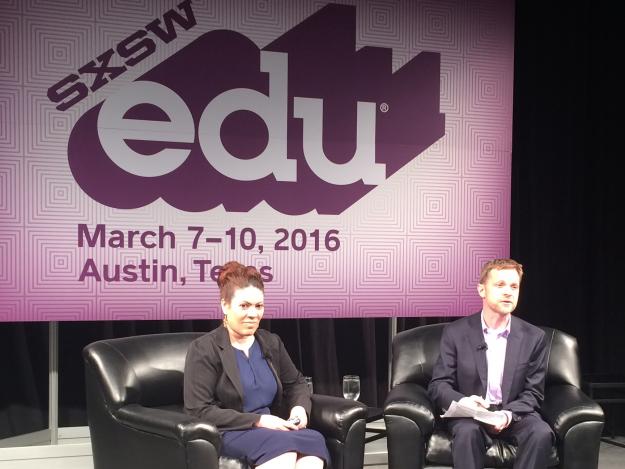Higher ed innovation dominates first day of SXSWedu

AUSTIN, TEXAS – One dean introduced a new cyber learning curriculum to his college. Another dean is starting a new university from scratch with a focus on science and technology.
SXSWedu brought together several experts in higher education who spoke about the need to innovate in colleges and universities, which are thought by some to be stagnant compared to foreign institutions.
“We have to find
ways to accelerate innovation across the country,” said Bridget Burns, executive director of the University Innovation Alliance, a coalition of 11 public research universities. “Otherwise, we’re sentencing our
universities to repeat their mistakes and failures.”
Robert Blaine, dean of undergraduate studies and cyber learning at Jackson State University, a historically black college in Mississippi, said he revamped the curriculum – with help and input from students – using technology. The school created its own digital textbooks, and gave every student an iPad.
“We’re building a 21st century learning culture for all our students,” Blaine said during a forum in which higher ed experts pitched their ideas and success stories in seven minutes or less. “We focused on the development of digital content.”
Blaine said the move has cut major costs for students, from textbooks ranging from $100 to $300 to digital content that can be downloaded for 99 cents.
Jackson State also has a new facility that promotes project-based learning. The room is separated into different workspaces: a discussion area, an area to flesh out new ideas and then realize them with computers and technology, and then a mini-makerspace to build.
Christine Ortiz, dean for graduate education of Massachusetts Institute of Technology, spoke about the new school she is planning to open in the Boston area that is going to model a flipped personalized learning classroom. There will be little distinction between undergraduate and graduate students, and all work will be project based and technology enhanced.
Read what other educators and IT leaders shared at SXSWedu — exclusive coverage from EdScoop.
Ortiz said the traditional research institution model may not be the best fit for students anymore to compete in a global economy.
“The current structure has invisible barriers to realize academic freedom,” Ortiz said. “By moving us to a place where people can focus on what they’re most passionate about is how we can accelerate and advance.”
Though she did not offer many specific details, Ortiz said students would follow “pathways” after exploring what kind of project they want to work on. These pathways would be designed by academics and industry experts from a variety of fields.
“We’re moving the university from an ivory tower to a platform based in society,” she said.
She added that she wants to attract students with diverse backgrounds, but admitted that cost is “the biggest challenge” to providing this type of cutting-edge education. Since it won’t be a traditional college, she said she will look at possible cost-cutting measures in housing, staffing and infrastructure.
Ted Mitchell, U.S. Department of Education under secretary, said the typical college student is also changing, and higher education institutions have to adapt in order to meet their needs.
“Today’s new normal student is likely to be a 24-year-old returning veteran or a single mom or dad working to balance life and education,” he said. “For those students, we need to make learning more flexible.”
Mitchell highlighted innovative testing and new ways of measuring student success, through data analytics and micro-credentials, which both students and teachers can use to show mastery in a subject.
“If you can measure student learning, then let’s certify that learning in chunks that are smaller than what we’ve previously used,” he said. “Let’s look at micro-credentials as a way of building up skills for students of all ages so they get credit for work they’ve mastered.”
Reach the reporter at corinne.lestch@edscoop.com and follow her on Twitter @clestch and @edscoop_news.



